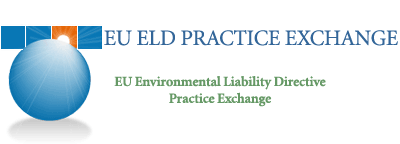|
The page highlights sselected meetings, documents, websites, case studies and other activities are highlighted hereundertaken by the European Commission, Member State Government Authorities, Industry and others concerning the ongoing implementation of the ELD. We invite your additions, including meeting presentations and materials, documents, articles and more. Information may be sent to info@nrdonline.org.
Meetings
The Ad-Hoc Industry Natural Resource Management Group has been tracking environmental liability and related meetings since 2004. For a listing of meetings in the current year, see here.
European Commission
Listed below are reports and regulatory proposals of the European Commission concerning the EU Environmental Liability Directive. Additional documents of note -- prepared by government, industry or other organizations -- can be posted here upon request.
Industry
Since 2004, the Ad-Hoc Industry Natural Resource Management Group has worked to facilitate discussions on best practices related to the ongoing implementation of the ELD. Listed below are some Group activities related to ELD best practices.
- Tracking of ELD Legislation, Cases, Sites and Related Information. Since the 2004 passage of the ELD, the Ad-Hoc Industry Natural Resource Management Group has been tracking and compiling all Member State legislation implementing the ELD in national law, as well as associated Member State guidance. For current information on a specific Member State status, contact us at info@nrdonline.org.
- Documents. The Group has also prepared numerous documents in an effort to foster the “reasonable, balanced and predictable” implementation of the ELD throughout the European Union. Some of the documents include: "The European Union Environmental Liability Directive -- Practical Suggestions to Ensure Sound Implementation" (February 2014); "European Union Environmental Liability Directive: An Update and Summary of Emerging Best Practices" (Re-issued January 2013); "White Paper: Environmental Liability Fund in the Context of the European Union Environmental Liability Directive" (December 2012); "Report: Survey of Industrial Companies -- Insurance and Other Financial Security Instruments and Remediation of Environmental Damages under the EU Environmental Liability Directive" (February 2010); "Implementation of the European Union Environmental Liability Directive: Summary of Guiding Principles and Recommended Best Practices" (July 2009); and "Industry Case Studies: An Examination of the European Union Environmental Liability Directive in Practice and Options Available to Member States" (February 2007 and Amended July 2009). For further information, contact us at info@NRDonline.org.
- ELD Best Practices Seminars. On an ongoing basis, work has been undertaken to develop "best practices" for key legal, administrative, technical and economic issues related to the implementation of the ELD in actual practice. Working with the European Commission, Member State Governmental Authorities and other experts, the Group has convened a series of "Best Practices Seminars" in order to identify, discuss and further expand these suggested best practices. The Group convened Seminars in 2007, 2008, 2009, 2010, 2013, 2014 and 2016. The next ELD Best Practice Seminar will be be held in May 2020.
Other
In addition to key government and industry websites (see Further Information), the website listed below provides resource information on remediation practice issues related to the ELD. Additional website resources are welcome here.
- REMEDE The REMEDE (Resource Equivalency Methods for Assessing Environmental Damage in the EU) Project, sponsored by the European Commission, was launched in October 2006 to "support Annex 2 of the Directive which lists different methodologies that can be used for this common framework". The final “Toolkit” report, released in 2008, identified methods to help determine the scale of remediation necessary to “offset” the environmental damage.
|

